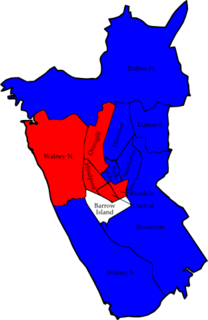Related Research Articles

Barrow-in-Furness, commonly known as Barrow, is a town and borough in Cumbria, England. Historically part of Lancashire, it was incorporated as a municipal borough in 1867 and merged with Dalton-in-Furness Urban District in 1974 to form the Borough of Barrow-in-Furness. At the tip of the Furness peninsula, close to the Lake District, it is bordered by Morecambe Bay, the Duddon Estuary and the Irish Sea. In 2011, Barrow's population was 57,000, making it the second largest urban area in Cumbria after Carlisle, although it is geographically closer to the whole of Lancashire and most of Merseyside. Natives of Barrow, as well as the local dialect, are known as Barrovian.

Barrow-in-Furness is a local government district with borough status in Cumbria, England. It is named after its main town, Barrow-in-Furness. Other settlements include Dalton-in-Furness and Askam-in-Furness. It is the smallest district in the county, but is the most densely populated, with 924 people per square kilometre. The population was 71,980 in 2001, reducing to 69,087 at the 2011 Census.
Barrow-in-Furness Borough Council in Cumbria, England is elected every 4 years. This was changed in 2011 from the previous situation where one third of the council was elected each year, followed by one year where there was an election to Cumbria County Council instead.
The 1998 Adur District Council election took place on 6 May 1999 to elect members of Adur District Council in West Sussex, England. One third of the council was up for election and the Liberal Democrat party lost overall control of the council to no overall control.
Elections to Barrow-in-Furness Borough Council were held on 7 May 1998. One third of the council was up for election and the Labour party stayed in overall control of the council.
The 2000 Barrow-in-Furness Borough Council election took place on 4 May 2000 to elect members of Barrow-in-Furness Borough Council in Cumbria, England. One third of the council was up for election and the council stayed under no overall control.
Elections to Barrow-in-Furness Borough Council were held on 2 May 2002. One third of the council was up for election and the council stayed under no overall control.
Elections to Barrow-in-Furness Borough Council were held on 1 May 2003. One third of the council was up for election and the Labour party gained control of the council from no overall control.
Elections to Barrow-in-Furness Borough Council were held on 10 June 2004. One third of the council was up for election and the Labour party kept overall control of the council.

Elections to Barrow-in-Furness Borough Council were held on 4 May 2006. One third of the council was up for election and the Labour party lost overall control of the council to no overall control.

Elections to Barrow-in-Furness Borough Council were held on 3 May 2007. One third of the council was up for election and the council stayed under no overall control.

Elections to Barrow-in-Furness Borough Council was held on 1 May 2008. The whole of the council was up for election, with the number of councillors falling from 38 to 36, as a result of ward boundary changes enacted in February 2008. Councillors were elected for terms ranging between two and four years; where more than one councillor was elected in a ward, the councillor with the highest number of votes was granted the longer term.

Cumbria County Council is the county council of Cumbria, a county in the North West of England. Established in 1974, following its first elections held a year before that, it is an elected local government body responsible for the most significant local services in the county, including county schools, county roads, and social services.
Elections to Calderdale Metropolitan Borough Council were held on 6 May 1999. One third of the council was up for election and the Labour party lost overall control of the council to no overall control. The overall turnout of the election was 30.09%. The winning candidate in each ward is highlighted in bold.
Elections to Dacorum Borough Council in Hertfordshire, England were held on 6 May 1999. The election in Highfield St Paul was delayed after the death of a Conservative candidate until a by-election was held on 3 June. The whole council was up for election with boundary changes since the Dacorum Council election, 1995|last election in 1995 reducing the number of seats by 6. The Conservative party gained overall control of the council from no overall control, although it would fall back to no overall control after the by-election in June.

Local elections were held in the United Kingdom on 3 May 1979. The results provided some source of comfort to the Labour Party (UK), who recovered some lost ground from local election reversals in previous years, despite losing the general election to the Conservative Party on the same day.

The 2010 Barrow-in-Furness Borough Council election took place on 6 May 2010 to elect members of Barrow-in-Furness Borough Council in Cumbria, England. One third of the council was up for election and the council stayed under no overall control.

The 2011 Barrow-in-Furness Borough Council election took place on 5 May 2011 to elect members of Barrow-in-Furness Borough Council in Cumbria, England. The whole council was up for election and the Labour party gained overall control of the council from no overall control.

The 2011 South Lakeland District Council election took place on 5 May 2011 to elect members of South Lakeland District Council in Cumbria, England. One third of the council was up for election and the Liberal Democrats stayed in overall control of the council.
The 2015 Barrow-in-Furness Borough Council election took place on 7 May 2015 to elect members of Barrow-in-Furness Borough Council in England. This was on the same day as other local elections.